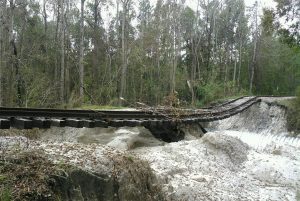
A Marine carries a mortar during an exercise in Oman.
WASHINGTON: A pair of memos from Marine Commandant Gen. Robert Neller paint a grim picture of the Corps’ fiscal health at a time when the White House and Pentagon bask in the glow of their record $750 billion request for fiscal 2020.
The missives, sent in recent weeks to the Navy Secretary and Acting Defense Secretary lay out a variety of factors — from devastating hurricanes, demands on the southwest border, and new, unfunded deployments to the boded with Mexico — that are forcing the Marines to cancel critical multinational exercises and training.
What the memos make clear is that the general’s most pressing concern — by far — is the fallout from September’s Hurricane Florence, which smashed into North Carolina’s Camp Lejeune, causing an estimated $3.6 billion in damage. The Corps doesn’t have enough money to repair the base before a new hurricane season whips up, and no new cash appears on the way from the Pentagon or Congress.

Commandant Robert Neller.
These issues — along with White House plans to pull billions from military construction projects to fund president Trump’s proposed border wall — will be met head-on next week when Acting Defense Secretary Patrick Shanahan and Chairman of the Joint Chiefs Gen. Joseph Dunford appear before the House Armed Services Committee.
In a taste of what is likely to come, committee chairman Adam Smith said in a statement, “we look forward to hearing how [Shanahan] intends to pilfer the military construction accounts, circumvent the intended nature of the law, while simultaneously abusing the trust of the American people.”
In the Senate, the top Democrat on the Armed Services Committee Jack Reed said late Thursday in response to the memos: “President Trump has ignored the facts, ignored the experts, and ignored a big bipartisan vote against his views on border security. I hope he doesn’t try to ignore this memo. Decorated, senior military leaders are raising clear warning flags and trying to prevent our military from being damaged.”
Citing “fiscal challenges without precedent” Neller said in a memo last month to Navy Secretary Richard Spencer that the inability to shift cash within the budget and lack of supplemental money for Hurricane Florence damage “is negatively impacting Marine Corps readiness.”

Hurricane Florence damage at Camp Lejeune. (Marine Corps photo)
The damage from Florence all but wiped out funding for several exercises and planned equipment modernization activities. Speaking to USNI News last month, Neller said, “if we have to pay that ourselves, it’ll take the [military construction] budget of the Marine Corps for probably the next four years.”
The memo also cited “unplanned/unbudgeted Southwest border operations” and “border security funding transfers” as adding “unacceptable risk to Marine Corps combat readiness and solvency.” He also singled out orders to deploy more Marines to Australia — without being given the funds to do so — and the lack of cash to follow through with orders to participate in the Navy’s Dynamic Force Employment concept as stressing factors.
These new orders have led to the Marine Corps already canceling Exercise Midnight Sun in Alaska and cutting back on participation in Exercise Northern Edge as the Corps attempts to do more in the Arctic. Other multinational exercises in Scotland have been scuttled, along with about $6 million worth of equipment maintenance planned this spring. Without action from Congress to craft a supplemental spending package, another $2 million in maintenance will be scrapped later this year, and further Arctic and Pacific exercises curtailed or cancelled, as well.
“Marines rely on the hard, realistic training provided by these events,” Neller wrote. “The experience lost by these units at a critical time in their preparation cannot be recouped.”
Costs of Extreme Weather
The Pentagon is looking at a growing list of bases that have been damaged or largely wiped out over the past six months due to extreme weather events. Joining Lejeune’s $3.6 billion price tag is the $5 billion the Air Force estimates it will take to repair Tyndall Air Base in Florida after it was walloped by Hurricane Michael’s 155-mile-per-hour winds last fall.
That $8.6 billion in repair work will likely push past the $10 billion mark once estimates come in from the historic flooding at Offutt Air Base in Nebraska, home of Strategic Command, which is currently 30 percent underwater and will need to repair or replace dozens of buildings, roads, and its main runway.

Cleanup at Tyndall after Hurricane Michael swept through. (US Air Force photo)
This unprecedented damage at three bases has raised alarm bells over how ready the Pentagon is to deal with climate change, and how it affects operations and readiness.
“DoD can’t count on 500-year storms coming every 500 years any more,” John Conger, director of Center for Climate and Security, and a former deputy comptroller at the Pentagon, told me. “They need a strategy to improve their resilience, and that starts by making sure any new investments are able to withstand extreme weather. As they develop recovery plans for Tyndall, Lejeune and Offutt, this has to be a core part of the conversation, not an afterthought.”
Conger added that the good news is “the instincts of the service leadership already appears to be aligned in this way, as you can see from General Neller memo and the new Air Force Installations Strategy that just came out. The challenge now will be to ensure it stays that way in the face of budget pressures.”
Air Force Secretary Heather Wilson told reporters on Capitol Hill last week she needs around $1 billion in fiscal 2019 to start work at Tyndall, and if Congress doesn’t put together a supplemental funding package by April she will have to start pushing back modernization projects at other bases.
The Defense Department budgeted about $2 billion for hurricane damage in the 2020 fiscal year budget, a number which will likely go drastically higher as Congress begins marking up the budget. Neller said the Corps needs at least $600 million in the 2019 fiscal year to begin needed repairs at Lejeune.
Defense industry could see big shakeup under Trump: 2025 Preview
President Donald Trump had a hands-on approach with the defense industry during his first administration. This time? Don’t rule it out.



























